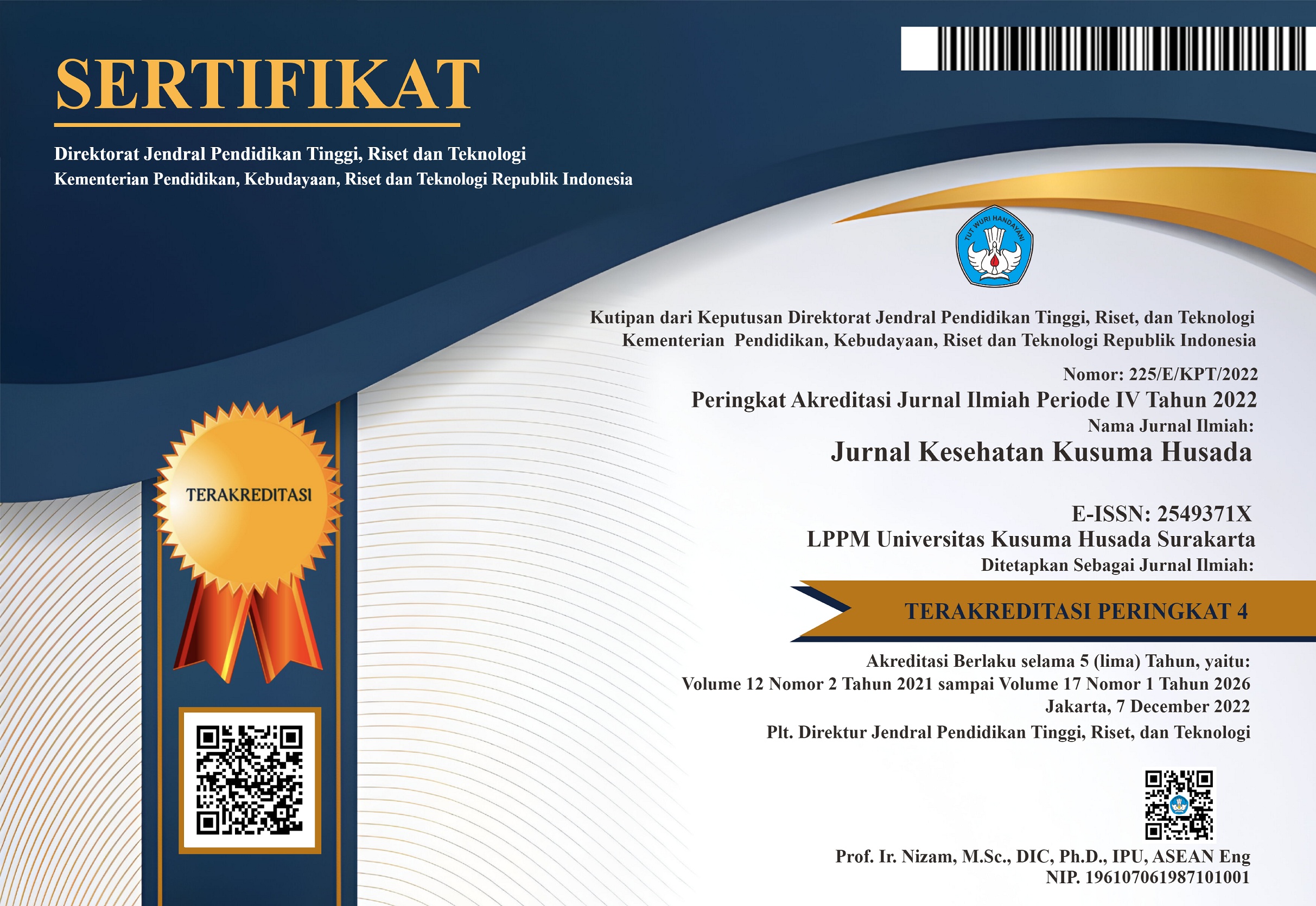PENGARUH PELATIHAN BANTUAN HIDUP TERHADAP KETERAMPILAN, KESIAPAN DAN MOTIVASI PENANGANAN CARDIOPULMONARY RESUSCITATION PADA MAHASISWA NERS
DOI:
https://doi.org/10.34035/jk.v15i1.1282Keywords:
Cardiopulmonary resuscitation, Keterampilan, Kesiapan, Motivasi, skills, readiness, motivationAbstract
Salah satu kondisi kegawatdaruratan adalah henti jantung. Bantuan Hidup Dasar atau tindakan Cardiopulmonary Resuscitation (CPR) merupakan intervensi untuk mengembalikan, mengembangkan, dan mempertahankan fungsi vital pada korban henti jantung dan henti nafas. Keterampilan melakukan BHD diperlukan semua orang termasuk mahasiswa yang bertujuan untuk mengurangi keparahan yang akan muncul dan dampak buruk selanjutnya. Sehingga mahasiswa diharapkan memiliki keterampilan, kesiapan dan motivasi dalam melakukan penanganan CPR. Penelitian ini bertujuan untuk mengetahui Pengaruh pelatihan Bantuan Hidup Dasar (BHD) terhadap keterampilan, kesiapan dan motivasi penanganan CPR pada Mahasiswa Ners. Metode penelitian ini merupakan quasi experiment dengan desain pre test and post test without control group design. Sampel dalam penelitian ini sebanyak 36 responden yang diperoleh dengan teknik purposive sampling. Analisis data dengan menggunakan uji statistik Wilcoxon. Hasil uji statistik Wilcoxon antara keterampilan responden sebelum seluruhnya (100%) kurang terampil dan setelah dilakukan pelatihan BHD 19 responden (52,8%) terampil. Kesiapan penanganan CPR sebelum intervensi 16 responden (44,4%) dalam kategori kesiapan cukup, sesudah intervensi 23 responden (63,9%) dalam kategori kesiapan baik. Motivasi responden sebelum 88,9% (kurang motivasi), sesudah 91,7% (motivasi tinggi). Hasil uji statistik Wilcoxon menunjukkan nilai p-value 0,000 Ë‚ 0,05 untuk keterampilan, nilai p-value 0,000 Ë‚ 0,05 untuk kesiapan dan nilai p-value 0,000 Ë‚ 0,05 untuk motivasi. Hal tersebut menunjukkan adanya pengaruh pelatihan Bantuan Hidup Dasar terhadap keterampilan, kesiapan dan motivasi penanganan CPR pada mahasiswa di Universitas Kusuma Husada Surakarta. Disimpulkan pemberian pelatihan bantuan hidup dasar berpengaruh pada tingkat keterampilan, kesiapan, dan motivasi responden dalam melakukan cardiopulmonary resuscitation.
One of the emergency conditions is cardiac arrest. Basic Life Support or Cardiopulmonary Resuscitation (CPR) is an intervention to restore, develop and maintain vital functions in victims of cardiac arrest and respiratory arrest. Skills in carrying out BLS are needed by everyone, including students, with the aim of reducing the severity that will arise and the subsequent negative impacts. So students are expected to have the skills, readiness and motivation to carry out CPR. This research aims to determine the effect of BLS training on the skills, readiness and motivation to handle CPR in nursing students. This research method is a Quasi Experiment with a Pre Test and Post Test Without Control Group Design. The sample in this study was 36 respondents obtained using the Purposive Sampling technique. Data analysis using the Wilcoxon statistical test. The results of the Wilcoxon statistical test between the skills of respondents before all (100%) were less skilled and after BLS training 19 respondents (52.8%) were skilled. Readiness to handle CPR before the intervention was 16 respondents (44.4%) in the sufficient readiness category, after the intervention 23 respondents (63.9%) were in the good readiness category. Respondents' motivation before 88.9% (less motivation), after 91.7% (high motivation). The results of the Wilcoxon statistical test show p-value of 0.000 Ë‚ 0.05 for skills, p-value of 0.000 Ë‚ 0.05 for readiness and p-value of 0.000 Ë‚ 0.05 for motivation. This shows the influence of Basic Life Support training on the skills, readiness and motivation to handle CPR among students at Kusuma Husada University, Surakarta. It was concluded that providing basic life support training affected the level of skills, readiness and motivation of respondents in carrying out cardiopulmonary resuscitation.
Downloads
Published
Issue
Section
License
The copyright of the published articles belongs to Jurnal Kesehatan Kusuma Husada.

This work is licensed under a Creative Commons Attribution 4.0 International License.
















